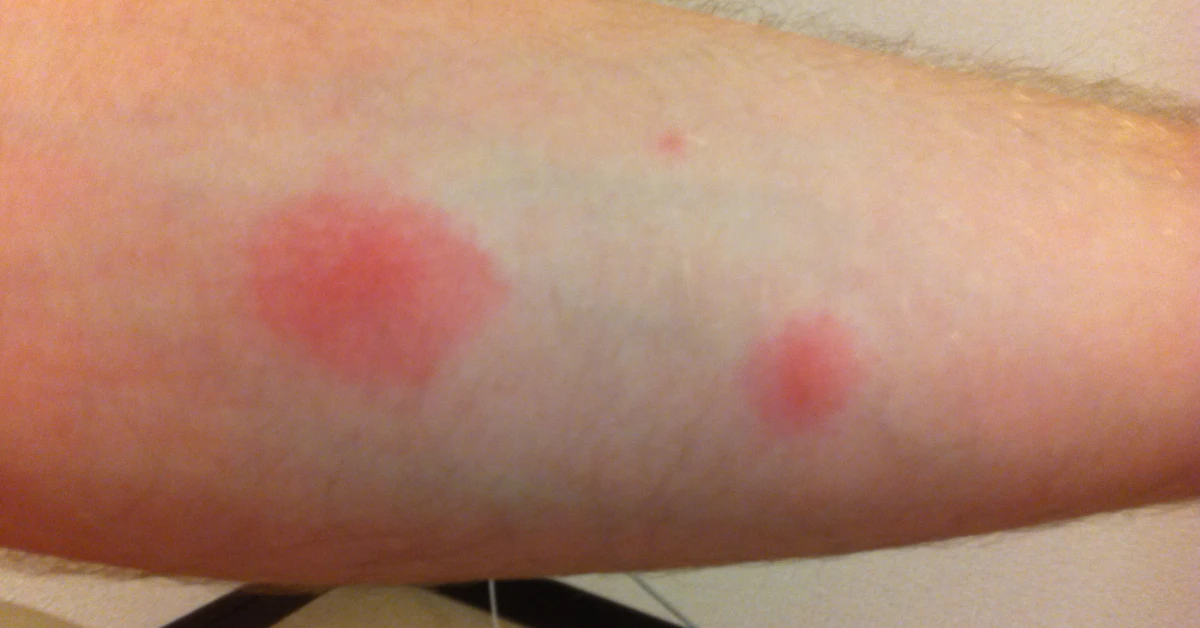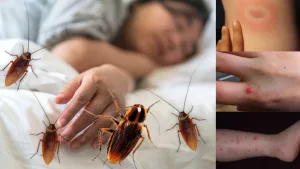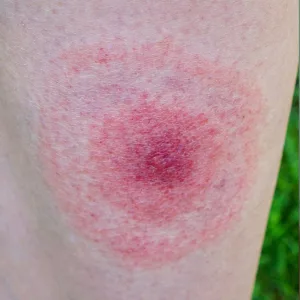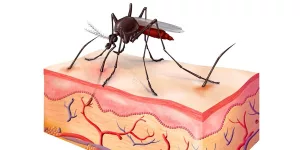Okay, let’s get weird for a second. Imagine this: You wake up one morning, scratching an itchy red bump on your arm. You chalk it up to a mosquito—maybe a spider, if you’re really unlucky. But then the thought creeps in, totally uninvited, like something scurrying across your kitchen floor in the dark: Can roaches bite you in your sleep?
I know, I know. It sounds like the start of a horror story nobody asked for. But hey, if you’re here, you’re probably just as curious (or maybe as freaked out) as I was the first time this crossed my mind. So, pull up a chair. Let’s get messy, a little bit real, and a whole lot informed about what really happens between humans and cockroaches when the lights go out.
We’re not just here to spook ourselves, though. Together, we’ll see the facts, the myths, and the “oh heck no, that can’t be true!” of the whole roach-bites-at-night situation. Ready to dive in? Yeah? Let’s go!
Do Roaches Actually Bite Humans?
First off, let’s just get this out there: You are not alone in wondering about this. In fact, it’s a surprisingly common question. The idea that a cockroach might crawl onto your bed and, well, take a little nibble while you’re snoozing is the stuff of urban legends… but is there any truth to it?
Why Would a Roach Bite?
Alright, so here’s where things get kind of interesting. Cockroaches are scavengers—think of them as the ultimate opportunists. If there’s food around, they’ll find it. But human flesh? That’s not exactly on their top 10 menu items. However, in rare circumstances (like super crowded infestations or, honestly, if there’s literally nothing else to eat), roaches have been known to bite humans (according PFHarris.com). Usually, it’s not out of aggression, but desperation. If you’ve ever left a midnight snack out and found a roach munching on it later, you know exactly what I mean.
Circumstances That Make Bites More Likely
- Severe infestations: If there are a ton of roaches and not enough food, they might get bold.
- Food residue on skin: Crumbs, grease, even a bit of sugary drink on your hands can attract them. Roaches have a sweet tooth, too!
- Sleeping habits: Sleeping with food in bed, or in areas with high roach activity, increases the risk.
But, seriously, before you panic—roach bites are actually very rare. Most cockroaches would rather scuttle away than take on a human. They’re not out for blood like mosquitoes or bed bugs. They’re just… opportunists. Like that one friend who always shows up if there’s free pizza.
Can Roaches Bite You in Your Sleep or at Night?
This is the million-dollar question, right? Can roaches bite you at night? The short answer: Yes, but it’s really not the norm.
Nighttime Behaviors of Cockroaches
- Roaches are nocturnal, so they’re most active when you’re fast asleep.
- They’re drawn to food smells—so, hands, faces, and mouths are prime real estate if you’ve got food residue there.
- If they do bite, it’s usually on exposed skin. Fingers, toes, and even eyelids have been reported (yes, really—eyelids!).
But again, this isn’t their go-to move. Think of biting as a last resort. Most of the time, they’re just looking for crumbs or spills, not a midnight snack on you.
How Common Are Roach Bites?
Here’s where you can probably breathe a sigh of relief: Roach bites are uncommon. Like, “getting struck by lightning while holding a winning lottery ticket” uncommon. In places with extreme infestations, or in environments where sanitation is a major issue, the risk goes up. But for the average person, it’s not something you need to lose sleep over (pun intended).
Real-World Examples and Expert Commentary
I actually chatted with a pest control pro once—let’s call him Dave, because all pest control guys should be named Dave, right?—and he told me he’s seen maybe a handful of real bites in twenty years on the job. Usually, it’s in places like ships, overcrowded apartment buildings, or areas with serious hygiene issues. And even then, roaches try literally everything else before resorting to biting a human.
But hey, if you’ve got a story, I’d love to hear it. Maybe you woke up with a mysterious mark and a guilty-looking roach nearby? (Or was it just a dream? Hard to say…)
What Do Roach Bites Look Like?
So, let’s say you wake up with a red, itchy bump and the first thing your brain screams is, “Can roaches bite you? Did that just happen to me?” I get it. Let’s break down what a roach bite actually looks like—and how to tell it apart from all the other bites you might get while you’re sleeping.
Identifying Roach Bites vs Other Insect Bites
Roach bites are usually small, red, and slightly raised—think mosquito bite, but a bit more oval-shaped. They can be itchy (sometimes intensely so), and, rarely, they might blister. The location can be a clue: fingers, toes, and soft skin around your face are the most common spots. But here’s the kicker—roach bites are often confused for other bugs. Mosquitoes, fleas, bed bugs… they all leave their signatures, too.
| Insect | Typical Bite Appearance | Common Bite Locations | Itchiness/Pain |
|---|---|---|---|
| Cockroach | Small, red, slightly raised, sometimes oval | Fingers, toes, face, eyelids | Moderate to intense itching |
| Mosquito | Round, puffy, red bump | Exposed skin | Very itchy |
| Bed Bug | Red, clustered, in a line or zigzag | Neck, arms, face, hands | Itchy, sometimes painful |
| Flea | Tiny red dots, sometimes with halo | Ankles, legs | Very itchy |
If you’re not sure, pay attention to the pattern. Roach bites are usually isolated, while bed bugs love to leave a trail (like little red breadcrumbs).
Symptoms, Size, Shape, and Appearance
- Itchy, red, raised welt
- Rarely blisters or gets infected (unless scratched a lot)
- Usually one or two bites, not a whole cluster
But, as always, if you’re really worried—or if the bite gets worse, swells up, or looks infected—don’t play doctor. Reach out to a healthcare professional. Better safe than sorry, right?
Can Roach Bites Cause Health Problems?
Okay, so you’ve got a bite. Should you freak out? No. Most roach bites are more annoying than dangerous. But, just like any bug bite, if you scratch it too much, you can open the skin and risk infection.
Allergic Reactions, Secondary Infections, and Risk Level
- Most people just get an itchy bump.
- Some people (especially those with sensitive skin or allergies) might get more redness or swelling.
- Serious reactions are super rare, but if you see signs of infection (pus, spreading redness, fever), see a doctor ASAP.
It’s worth noting that roaches themselves can carry bacteria and germs, but the bite itself isn’t likely to transmit anything dangerous. The real health risk is more about what they track in on their little legs (and, okay, their poop) than the bite itself. Gross, but true.
How to Know If Roaches Are in Your Bedroom
Let’s be honest: Nobody wants to share their sleeping space with roaches. So how can you tell if they’re lurking around when the lights go out?
Signs of Roach Infestation
- Seeing them at night: Roaches are shy during the day but brave in the dark. If you see one scurrying across the floor at 2 a.m.… yeah, you’ve got company.
- Droppings: Tiny dark specks (think: coffee grounds or black pepper) in corners, drawers, or along the baseboards.
- Musty odor: Roaches stink. If your room smells weird and you can’t figure out why, it could be them.
- Egg casings: Brown, oval capsules in hidden spots (behind furniture, inside drawers).
- Shed skins: Roaches molt as they grow, so you might find their old “jackets” lying around.
If you spot any of these signs, it’s time for a little detective work. Check under the bed, behind the dresser, and anywhere dark and cozy. Roaches love tight spaces.
Can Cockroaches Travel on a Person?
This one comes up a lot: Can cockroaches travel on a person? The short answer is—rarely. Roaches aren’t like lice or fleas. They don’t want to be on you. They don’t cling to hair or skin. But if you’re sitting or sleeping in a heavily infested area, it’s possible for a wandering roach to hitch a ride on your clothes or belongings—usually by accident, not because they “like” you. (Talk about awkward uninvited guests…)
Debunking Myths About Roach Mobility and Habits
- Roaches don’t actually “live” on people.
- They’re not looking for hosts, just food and shelter.
- If one crawls on you, it’s probably just lost or exploring, not setting up camp.
So, if you wake up and find a roach on your pillow—yeah, it’s gross, but it’s not trying to move in. Just bad luck (and maybe time to check for an infestation).
What To Do If You Think You’ve Been Bitten
Okay, so you wake up, see a mysterious red bump, and your brain is screaming, “Can roaches bite you? Did that just happen to me?” First off—deep breath. It’s not the end of the world, I promise. Here’s what to do next:
First Aid and Treatment for Roach Bites
- Wash the area gently with soap and water. This helps prevent infection.
- Apply a cool compress to soothe itching and reduce swelling.
- Try an over-the-counter anti-itch cream (like hydrocortisone) if it’s driving you crazy.
- Avoid scratching! (I know, easier said than done. Maybe try wearing gloves to bed if you’re a sleep-scratcher.)
- If you notice signs of infection—spreading redness, pus, fever—see a doctor.
Most bites will clear up on their own in a few days. If you’re worried, or if you have allergies, it’s always a good idea to check in with a healthcare provider. They’ve seen it all, trust me.
Preventing Roach Bites While You Sleep
Here’s the good news: You can totally stack the odds in your favor and make your bedroom a no-roach zone. Here’s how:
- Clean up before bed: Don’t leave dishes, crumbs, or snacks out. Wipe down surfaces. Roaches are all about the leftovers.
- Seal food tightly: Store snacks in airtight containers—especially sweet and starchy stuff.
- Fix leaks: Roaches need water, so fix drippy faucets or pipes.
- Declutter: Less clutter = fewer hiding spots.
- Seal cracks and entry points: Caulk gaps around windows, doors, and baseboards.
- Pest control products: Use baits, traps, or professional sprays if you spot signs of an infestation. (Just follow label instructions—safety first!)
Pro Products and Home Remedies—What Experts Recommend
- Baits and gels: Professional-grade baits work by attracting roaches and poisoning the whole colony.
- Borax powder: Sprinkle in corners and behind appliances (just keep away from kids and pets).
- Sticky traps: A good way to monitor if you still have a problem—and oddly satisfying to check in the morning.
- Call a pro: If you’ve tried everything and they’re still around, a pest control expert can help.
And remember, prevention is always easier than dealing with an infestation. Make your home as unappealing to roaches as possible, and they’ll (hopefully) look elsewhere for their midnight snack.
The Truth About Roaches, Sleep, and Your Health
Now, let’s zoom out for a second. Roaches get a bad rap—and, let’s be real, they’ve earned most of it. But is it all doom and gloom? Should you be up all night worrying about being bitten?
Are There Any Benefits to Roaches?
Okay, don’t throw tomatoes at me for this one. In the grand scheme of things, roaches play a role in the ecosystem. They’re nature’s cleanup crew, breaking down decaying matter and recycling nutrients. Without them, we’d have a lot more… well, mess. Even so, you probably don’t want them in your house, right?
Their Role in the Ecosystem (A Balanced View)
- Roaches help decompose organic material.
- They’re food for birds, lizards, and other critters.
- Some cultures even consider them a delicacy! (But don’t worry, I won’t judge your dinner choices.)
So, while they might be fascinating in the wild, in your bedroom—not so much.
Risks vs Reality: Should You Be Worried?
Here’s the honest truth: For most people, the risk of a roach bite is pretty close to zero. Are there exceptions? Sure. But if you keep your home clean and tackle any signs of infestation quickly, you’re way ahead of the game.
Most roaches just want to do their thing and stay out of your way. They’re not plotting to bite you while you sleep—they’re just looking for crumbs, water, and a dark place to hide. So, don’t lose sleep over it. If you ever do get bitten, treat it like you would any other bug bite, and focus on prevention.
And if you’re still worried, remember: you’re not alone. There are tons of resources, products, and professionals out there to help. You’ve got this!
Conclusion
So, can roaches bite you in your sleep? Technically, yes—that’s the wild, weird truth. But it’s super rare, and you’d almost have to work hard to make it happen (think: leaving pizza crust on your pillow every night for a month). If you keep things clean, stay alert for early signs of infestation, and act quickly, you’ll sleep easy. And if you ever wake up with a mysterious bite? Don’t panic. It’s probably not a roach. But if it is, you know exactly what to do now.
Remember, you’re in control. Your home is your sanctuary. And even if the occasional creepy-crawly tries to cross the line, you’ve got the knowledge, the tools, and the confidence to show them the door (preferably, slammed shut behind them).
Hey, what do you think? Ever had a run-in with a roach in the night? Got a wild story, or a tip that worked wonders for you? Share your thoughts, your questions, or your best roach-busting hacks below. We’re in this together—let’s keep our homes (and our dreams) roach-free!

























Leave a Reply
You must be logged in to post a comment.